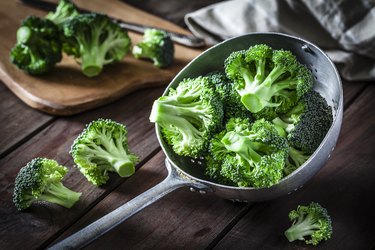
While lymphoma is a serious disease requiring medical intervention, you do have access to a valuable cancer-fighting tool in the form of food. You can harness the lymphoma diet to play a role in your treatment regimen.
Just as a higher intake of nutritious foods is associated with a lower incidence of lymphoma, so also a higher intake of less-nutritious foods is linked to a heightened incidence, concluded a 2012 study published in the Pan African Medical Journal. In addition to adhering to an eating plan that maximizes the likelihood of survival, lymphoma patients may also need to employ special dietary practices to manage the side effects of treatment.
Video of the Day
Video of the Day
Foods That Help Fight Cancer
A good rule of thumb is to center your diet around plant foods such as fruits, vegetables, whole grains and legumes. These dietary components are rich sources of antioxidants, fiber and folate, all of which have value in fighting tumor development and progression. A 2011 study published in the journal Leukemia and Lymphoma suggested that eating more citrus fruits and vegetables might increase survival in patients with non-Hodgkin's lymphoma.
According to the Leukemia & Lymphoma Society, you should set a goal of eating five to 10 servings of fruits and vegetables daily. Eat at least one serving per day of cruciferous vegetables, which include cabbage, broccoli, cauliflower, kale, Brussels sprouts, watercress and radishes.
Diet That Reduces Cancer Risk
Harvard Health Publishing advocates a diet from the World Cancer Research Fund/American Institute for Cancer Research (WCRF/AICR), which emphasizes a plant-based diet that limits the consumption of red meat to no more than 18 ounces per week. This eating plan also puts a strong focus on avoiding sugary beverages, processed foods and alcohol. In the WCRF/AICR 2018 report, titled Diet, Nutrition, Physical Activity and Cancer: A Global Perspective, researchers found the more people followed the organization's recommendations, the lower their incidence of cancer was.
Read more: 8 Cancer-Causing Foods You Need to Stop Eating Now
Example of a Beneficial Diet
An example of a plant-based diet is the Mediterranean diet, which a 2018 study featured in the International Journal of Cancer indicates may be inversely related to lymphoma risk. It's composed of fruits, vegetables, nuts, whole grains, olive oil, legumes and fatty fish. The legumes and fish are sources of protein, whereas the nuts, olive oil and fish are sources of healthy fat.
Practices That Minimize Chemotherapy Effects
The National Cancer Institute reports that as many as 80 percent of cancer patients experience nausea and vomiting, problems that significantly impair quality of life. Those with such maladies often have little interest in eating and drinking, which can lead to malnutrition and dehydration.
A good lymphoma diet should include measures to help manage the side effects of chemotherapy. The Cancer Treatment Centers of America makes several recommendations for coping with treatment-related digestive disturbances. For example, instead of skipping a meal entirely, patients should try to eat small, bland meals every two hours. They also may find cold foods easier to tolerate than hot ones. Ginger and peppermint, two natural anti-nausea agents, may help as well.
Read more: Nutrition Steps for Stage 4 Cancer
Diet Following Stem Cell Transplants
People with lymphoma who have undergone a stem cell transplant may experience neutropenia, a condition involving low levels of neutrophils, white blood cells that protect against infections, says the American Cancer Society. When this happens, patients are at risk of getting ill from the bacteria in food and beverages. To reduce the risk of infections, doctors may advocate a neutropenic diet, which prohibits the intake of fresh produce and unpasteurized dairy products, along with undercooked meat and fish.
- Leukemia & Lymphoma: Vegetable and Fruit Intake and Non-Hodgkin Lymphoma Survival in Connecticut Women
- Leukemia & Lymphoma Society: Healthy Eating
- Harvard Health Publishing: Specialized Diet Gets High Marks for Preventing Cancer
- National Cancer Institute: Treatment-Related Nausea and Vomiting
- Cancer Treatment Centers of America: Nausea and Vomiting
- American Cancer Society: What's It Like to Get a Stem Cell Transplant?
- The Pan African Medical Journal: Diet and Non-Hodgkins Lymphoma Risk
- International Journal of Cancer: Adherence to the Mediterranean Diet and Lymphoma Risk in the European Prospective Investigation Into Cancer and Nutrition